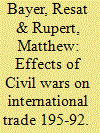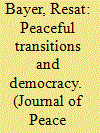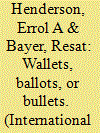|
|
|
Sort Order |
|
|
|
Items / Page
|
|
|
|
|
|
|
| Srl | Item |
| 1 |
ID:
060815


|
|
|
| 2 |
ID:
100389


|
|
|
|
|
| Publication |
2010.
|
| Summary/Abstract |
While there has been extensive interest in the role of democracy in reducing interstate violence, the role of democracy in reaching higher levels of peace has received much less attention. Since many countries have less than amicable relations, it is necessary to consider how the quality of peace can be improved. The quality of peace becomes particularly relevant when assessing relations of countries with a bellicose past. In order to capture improvement in relations, this article relies upon a framework that captures the various levels of peace that countries experience. The study maintains that democracy contributes to former belligerents reaching the highest levels of peace but that it is not helpful at the lower levels especially if only one side is a democracy. The article tests arguments on a dataset that captures the transitions from one level of peace to another for all former belligerents since 1816 and relies upon event history analysis. The results for peace are not the opposite of what is found for war. The findings demonstrate that democracy plays a substantial role in peaceful transitions at all levels. However, while joint democracy is important for reaching the highest levels of peace, democracy can hamper the progress of relations at the lowest levels of peace.
|
|
|
|
|
|
|
|
|
|
|
|
|
|
|
|
| 3 |
ID:
120872


|
|
|
|
|
| Publication |
2013.
|
| Summary/Abstract |
We examine the extent to which wealth, democracy, and/or relative military capabilities contribute to victory in interstate war. Examining contingency tables, we find that states with greater military capabilities are more likely to win their wars whether they are wealthier or democratic, and democratic states perform marginally better than wealthier states in war. Probit analyses indicate that although each of the variables has a robust and positive impact on war victory, relative capabilities has the strongest substantive impact, followed by wealth, then democracy. Hazard analyses reveal that states with greater military capabilities fight shorter wars than either democracies or wealthier states, and controlling for capabilities and wealth, the relationship between democracy and war duration is not significant, which challenges the view that democracies have a unique propensity to fight shorter wars. We also find that the democratic victory phenomenon is not universal, but is contingent on the placement of a single country, Israel, in the Western or non-Western democracy category. In sum, our analyses indicate that although each of the three factors contributes to war victory, relative military capability is the most powerful, consistent, and robust predictor to victory in interstate war.
|
|
|
|
|
|
|
|
|
|
|
|
|
|
|
|
|
|
|
|
|